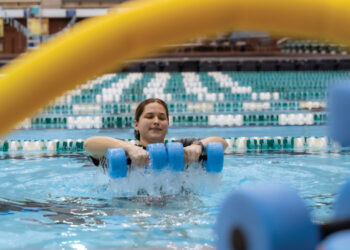Kathy Bayless is the Director of Recreational Sports at Indiana University.
1. How did you get started in the industry? What drew you to collegiate recreation?
The ultimate decision to commit to a career on the sports side of the ledger was shaped by numerous variables along the way. The incubator was growing up in a neighborhood comprised mostly of boys and playing games and sports all the time. It was influenced by hours on the sidelines cheering for boy’s teams, rather than having similar opportunities as a young woman. It was sparked by an invitation to join a student-led recreational sport advisory committee in college, combined with work experience in the office and as an intramural official. It was fueled by the opportunity to attend my first Campus Recreational Sports Conference through NIRSA in 1972, when I was a junior in college.
It was galvanized when I learned about a brand new graduate program for recreational sport management at Indiana University that was the first of its kind in the country. I was thrilled at being able to focus exclusively on a recreation philosophy of sport whereby everyone was able to play regardless of skill, ability, interest or gender. It was seasoned and developed by years of learning through the school of hard knocks as the first female to hold a full-time position in recreational sports at IU in 1974 and as the first female director at IU and in the Big Ten in 1992. It has been inspired ever since by all the students who have discovered a place to belong, grow and develop in campus recreational sports as participants, employees and leaders. It has been enriched by 43 years of opportunities to serve, learn and lead alongside valued colleagues in the field.
2. Throughout your time at IU, what is one accomplishment you are most proud of?
Being part of shaping a culture that meets the needs of the underserved to ensure inclusion of all — regardless of age, gender, race, ability, ethnicity or interest. This has been a life-long commitment after seeing all the ways exclusion is harmful to individuals and community. This has been especially gratifying given the long-standing zeal for athletic prowess.
3. What is one lesson you have learned that other recreation professionals can learn from?
Oh my, too numerous to count. Tough question, as learning never ends. For this purpose, it would be the opportunity we have to learn from everyone and every situation, especially from the “school of hard knocks.” Believing in taking short-cuts to learning and pursuing a fast-track to advancement is akin to building a “house of cards.”
4. What is one of the biggest challenges you have faced throughout your career and how did you overcome it?
Coming up as a woman in the sport industry and in higher education. It took a long time to get comfortable “in my own skin.” The potential for gender-bias remains, but so does the potential for all kind of bias. The difference for me is having embraced a commitment to root decisions in principles and values over popular opinion or situational ethics.
5. Tell us one fun fact about yourself that others may not know?
It was a blast winning a calf-roping contest at a conference in Ft. Worth, Texas.










